Laying the molecular foundation of mechanobiological signalling in the heart
Scientists from the Mechanobiology Institute (MBI) at NUS, together with clinical researchers from the Cardiovascular Research Institute under the National University Health System, discovered how a scaffolding protein responds to mechanical signals, activating biochemical signals to control the differentiation of cardiac muscle cells. This brings scientists a step closer towards uncovering ways to enhance cardiac muscle growth and regeneration.
The research team was led by Dr Darren Wong, Research Scientist at MBI, under the supervision of MBI Principal Investigators Associate Professor Low Boon Chuan and Associate Professor Pakorn Kanchanawong in partnership with consultant cardiology Professor Roger Foo from the NUS Yong Loo Lin School of Medicine.
The team adopted genetic and biochemical methods together with biophysical analysis and super-resolution microscopy imaging as a form of interdisciplinary approach to study the molecular responses of cardiac muscle cells to biochemical and mechanical signals. BNIP-2, a signalling scaffold protein was the focus of this present research because of its involvement in cell movement, growth, and skeletal muscle cell signalling pathways.
Through their experiments, the team found that a mechanical signal such as the contraction of cardiac muscle cells caused the activation of a biochemical signalling pathway involving BNIP-2, which will bring together a group of proteins, resulting in turning off of genes that promote cell growth. Results from the study represents a first step in understanding the integrative work of mechanical and biochemical signals in controlling cardiac muscle differentiation that can help reveal the underpinnings of cardiac ageing.
Read more about it here.



